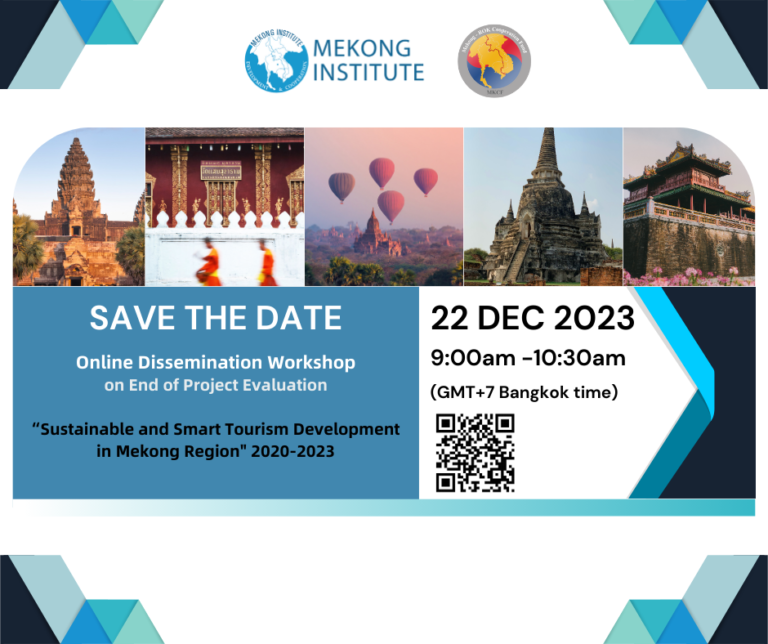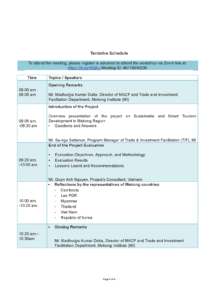The Mekong Institute (MI), serving as the Project Implementing Agency for the Mekong-Republic of Korea Cooperation Fund (MKCF), organized various activities across five Mekong countries – Cambodia, Lao PDR, Myanmar, Thailand, and Vietnam (CLMTV) – as part of the ‘Sustainable and Smart Tourism Development in the Mekong Region’ project, which took place from April 2020 to November 2023. The project aimed to (a) enhance the quality of hospitality and tourism services, (b) foster collaboration between the Republic of Korea and Mekong countries through historical and cultural town twinning, and (c) boost tourism competitiveness via smart technologies in Cambodia, Lao PDR, Myanmar, Thailand, and Vietnam. These goals were achieved through a series of activities, including the development and provision of smart tourism tools, techniques, and technologies through learning exchanges, information-sharing, and the adaptation of best practices. These investments were aimed at expanding small entrepreneurial businesses and fostering cultural interconnectedness and appreciation between cities in the Republic of Korea and the Mekong region countries.
The Mekong Institute conducted an end-of-project evaluation to assess the activities implemented during the project period. The survey was carried out in the CLMTV countries through Key Informant Interviews (KIIs) and Focus Group Discussions (FGDs) as well as via online survey. The results of this evaluation will be shared at an End of Project Evaluation and Dissemination Workshop scheduled for December 22, 2023, from 09:00 am to 10:30 am (Bangkok Time).
The online workshop will update the project’s stakeholders, and beneficiaries in the CLMTV, including partners in the Republic of Korea, about the outcomes of the implemented activities.
The ‘Sustainable and Smart Tourism Development in Mekong Region’ project was successfully implemented in the CLMTV countries and Republic of Korea over three years. The following steps will be followed for project closure:
- Share the results of the implemented project activities. This involves identifying and documenting the challenges encountered, the lessons learned, and the best practices adopted, thereby highlighting the success stories that have arisen from the project.
- Compiling a compendium such as digital platforms, Tourism curriculum development introduced throught the lifespan of the project. This will serve as a resource for potential replication or future activities of a similar project.
- Documenting country-specific case-studies, based on the implementation of project activities. These case studies will provide an in-depth perspective of the project’s impact and effectiveness within each participating country.
- Preparing a comprehensive policy brief aimed at the governments of Cambodia, Lao PDR, Myanmar, Thailand, and Vietnam (CLMTV). This policy brief will highlight significant findings and propose a set of next steps, encouraging the continuation of efforts towards the development of a sustainable and smart agricultural supply chain in the Mekong.
The workshop will present an assessment of the project’s implemented activities, delivered in the format of a PowerPoint presentation. This presentation will incorporate the following key points:
- Evaluation Objectives, Approach, and Methodology
- Evaluation Results
- Lessons Learnt and Recommendations
The workshop is targeted the project stakeholders and beneficiaries, as well as participants in training and workshops who attended activities throughout the project. These target groups comprise senior officials from the national Ministries of Tourism, Culture, and Universities, alongside members of business associations and service providers from local tourism authorities, ecotourism, and community-based tour operators. Additionally, participants include representatives from think tank institutions and advocates of sustainable tourism all of whom were selected from the CLMTV countries.
The workshop is intended to deepen the understanding to stakeholders and beneficiaries as to the impact of this project in terms of its effectiveness as a capacity building mechanism. The event presents an opportunity for the CLMTV governments and the Mekong Institute to gather specific recommendations and feedback on the project. These insights will provide a structured path towards project closure and offer valuable policy advice for Mekong countries interested in further promoting sustainable and smart cities.
MKCF’s Project Implementing Team
Telephone: +66 (0) 43 202411, Extension 2102 (TIF)
Email: [email protected]
Mekong Institute
123 Mittraphap Road, Muang District,
Khon Kaen 40002, Thailand
Website: https://www.mekonginstitute.org
To download the concept note, click here.




